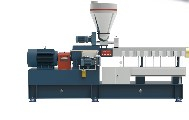A lab extruder machine is a specialized piece of equipment designed to process polymers and other materials on a small scale. It is widely used in research laboratories, educational institutions, and product development facilities to simulate industrial extrusion processes, test new formulations, and develop customized materials. The compact size and precise control capabilities of a lab extruder machine make it an invaluable tool for scientists and engineers working to innovate and optimize polymer products.
One of the primary functions of a lab extruder machine is to replicate the extrusion process typically found in larger manufacturing settings, but in a controlled and flexible environment. This allows researchers to study how different materials behave under heat and pressure, examine the effects of additives, and assess the mechanical properties of the extruded product. By working on a smaller scale, labs can save time and materials while gaining valuable insights before scaling up production.
Lab extruder machines come equipped with advanced control systems that enable precise regulation of temperature, screw speed, and feed rate. These controls are critical for achieving consistent melting, mixing, and shaping of polymers, which in turn affects the quality and characteristics of the final product. Different screws and dies can be installed to accommodate various materials and desired product shapes, making the equipment highly versatile.
In addition to polymer processing, lab extruder machines are also used for compounding—mixing polymers with fillers, colorants, or other additives to create new materials with specific properties. This capability is especially important in developing high-performance plastics for industries such as automotive, medical devices, and packaging.
Despite their small size, lab extruder machines often mimic the key mechanical and thermal conditions of industrial extruders. This similarity ensures that data and samples produced in the lab are relevant and scalable, which aids in product development and troubleshooting. Moreover, lab extruders typically require less power and are easier to clean, further enhancing their suitability for experimental work.
However, the capacity of a lab extruder machine is limited compared to full-scale production equipment. It is designed primarily for small batches and testing, not for mass manufacturing. Users must also be skilled in operating the equipment and interpreting the results to maximize its benefits.
In summary, a lab extruder machine is a crucial asset for material scientists and engineers focused on polymer research and product innovation. Its ability to simulate industrial extrusion on a manageable scale helps accelerate development cycles, reduce costs, and improve material performance. By leveraging the precision and flexibility of a lab extruder, organizations can make informed decisions before transitioning to large-scale production.
